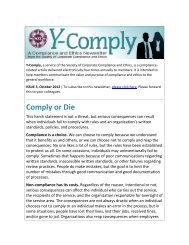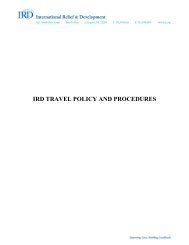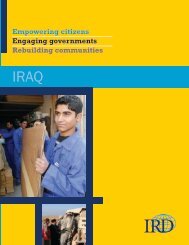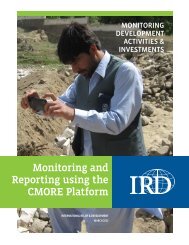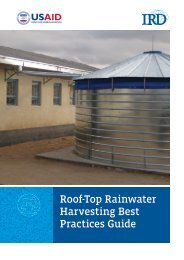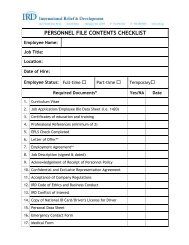IRD Vehicle Policy - International Relief & Development
IRD Vehicle Policy - International Relief & Development
IRD Vehicle Policy - International Relief & Development
Create successful ePaper yourself
Turn your PDF publications into a flip-book with our unique Google optimized e-Paper software.
Title: <strong>Vehicle</strong> <strong>Policy</strong> Effective Date: 11/22/10<br />
every <strong>IRD</strong> project will need the level of security precautions listed below, the general guidelines for safe<br />
operation of vehicles for any project should be followed. In more secure countries, the Chief of Party<br />
will determine the level of security precautions to take in regards to vehicles. (See: Security and Traffic<br />
Incident Report)<br />
General Guidelines<br />
<br />
<br />
<br />
<br />
<br />
<br />
<br />
<br />
<br />
<br />
<br />
<br />
<br />
<br />
<br />
<br />
<br />
<br />
<br />
Wear seat belts – Always.<br />
Select primary and alternate routes that avoid checkpoints.<br />
Vary routes and times.<br />
Notify others of your travel time and destination and steps they should take in the event you do<br />
not arrive as scheduled.<br />
Check the vehicle daily. <strong>Vehicle</strong>s must be well maintained.<br />
Do not travel without an HF or VHF radio, first-aid kit, maps, compass, and other emergency<br />
supplies.<br />
Have travel documentation in order. Always carry your international driver’s license or a valid<br />
license for the host country.<br />
Require the driver to fill out a vehicle log after each use. A log should include drivers’ names,<br />
destinations, dates, and times and be kept in each vehicle.<br />
Observe local driving laws and regulations.<br />
Avoid night driving when possible.<br />
Never let fuel tank fall below half full. Refuel at the end of each day, when possible.<br />
Always travel with at least one other person.<br />
Keep a spare key.<br />
Never carry an unauthorized passenger.<br />
Consider posting decals on your door or window indicating guns are not permitted in the<br />
vehicle.<br />
Drive at the safest speed for prevailing conditions.<br />
Keep doors locked.<br />
Keep a minimum number of windows open (no more than five centimeters and only those<br />
windows near occupied seats).<br />
Constantly check rear-view mirror.<br />
Never leave vehicles unattended.<br />
Each new arrival will receive technical training, if necessary, in mine awareness, vehicle operation, and<br />
the operation of radio equipment. Curfews will be considered and/or implemented for times of travel by<br />
the Security Review Team or Designated Security Officer. No-go zones will be considered and/or<br />
implemented by the Security Review Team or Designated Security Officer for areas or places that may<br />
be specific targets, such as political buildings and/or certain restaurants/clubs.<br />
Notice: A printed copy of this document may not be the latest version.<br />
Available online: https://portal.ird.org<br />
Updated: April 2012 8


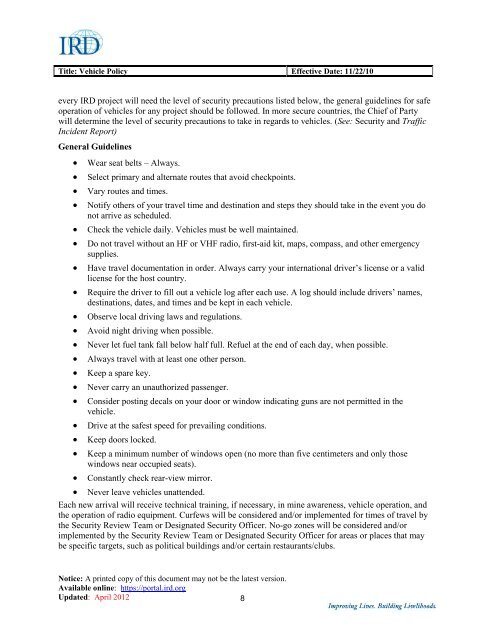
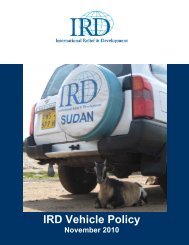
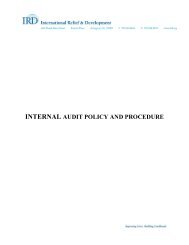
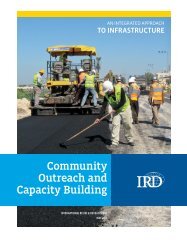
![Guide bonne pratique production d'oignon qualité_VF_4_2411012[1]](https://img.yumpu.com/23506639/1/184x260/guide-bonne-pratique-production-doignon-qualitac-vf-4-24110121.jpg?quality=85)

